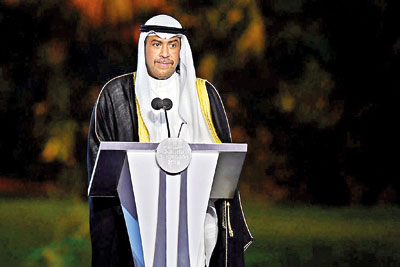Columns
Powerful Kuwaiti sheikh changes goalposts in Asian soccer
View(s):
Sheikh Ahmad al-Fahad al-Sabah’s continuing involvement in soccer shows how the most influential figures in sports often find ways to maintain their grip on the levers of power even when they are not supposed to. AFP
Mariyam Mohamed Didi lost her bid for a seat in the Asian Football Federation (AFC) last week because of strong lobbying against her by Kuwait’s Sheikh Ahmad al-Fahad al-Sabah, who is a member of the Royal family and runs the Olympic Council of Asia.
The New York Times reported that the Maldivian did not realise a powerful Arab sheikh would play a significant role in deciding exactly who gets a seat at soccer’s top table.
As a result of the lobbying, the AFC decided to re-elect Bangladesh’s Mahfuza Akhter Kiron, “who was practically unknown when she beat more experienced challengers in 2017, and has rarely spoken during her tenure in the $250,000 a year post,” the Times said.
Ms Kiron had the backing of the Kuwaiti Sheikh, who reportedly steered voters toward his desired outcome, according a complaint Ms Didi filed with A.F.C.’s election oversight panel.
At the AFC’s elections, the sheikh’s luxury suite at Kuala Lumpur’s Hyatt Hotel, close to the venue where voters had gathered, was where decisions were taken, according to officials who met him. They included Ms Didi, described as a soccer official from the Maldives. She met him in his suite.
In the complaint and in an interview with The New York Times, Ms Didi provided a rare glimpse of how power functions at the highest levels of soccer, and how little has changed even in the aftermath of a major scandal in 2015.
Sheikh Ahmad, she said, told her to drop out of the election because he had already decided to back Ms Kiron. If she did as she was told, he would be able to place Ms Didi in another position, either at International Federation of Association Football (FIFA) or within Asian soccer. If she didn’t, her career was effectively over, and her country, would also suffer, he suggested, according to the Times.
“He said this is how it works in politics, it’s not football,” Ms Didi recalled of the meeting in a telephone interview. “He said: ‘It’s not based on experience, it’s the relationships we have with each other.’ And that was the end.”
Ms Didi tried to convince him to change his mind, but he would not. “I said, ‘Please don’t do this,’” she said. “I didn’t want to withdraw. I just wanted to tell him not to use his powers to influence this.”
A spokesman for Sheikh Ahmad at the Olympic Council of Asia did not respond to a request for comment.
The sheikh, who runs the Olympic Council of Asia, an umbrella group for Olympic committees created by his late father, has been identified as a co-conspirator in a US Department of Justice soccer corruption case in 2017. He subsequently resigned from FIFA’s ruling council and pledged to withdraw from soccer while the case was being litigated.
The Times said his continuing involvement shows how the most influential figures at the highest levels of international sport often find ways to maintain their grip on the levers of power even when they are not supposed to.
 SriLankan pilots say ex-CEO Ratwatte owes millions to the airline
SriLankan pilots say ex-CEO Ratwatte owes millions to the airline
SriLankan Airlines pilots have renewed their call to surcharge former Chief Executive Officer (CEO) Suren Ratwatte for obtaining A 320 training, costing “millions” of rupees to the national carrier.
The pilots have now made representations to the Commission to Investigate Allegations of Bribery or Corruption (CIABOC). The Airline Pilot’s Guild of Sri Lanka (APGSL) has alleged that the then Chairman Ajith Dias and the human resources department head had not placed a training bond; nor requested that Captain Ratwatte undertake an insurance for training.
Earlier, in a letter to the then SriLankan Chairman G.S. Withanage, APGSL President Captain Ruwan Vithanage said, “On recruitment of a Cadet for the purpose of training him/her as a Pilot for the Company, the trainee is required to purchase an insurance as a safeguard for the Company investment, in the event the trainee fails to meet the required standard. On conclusion of the training and when employed by the Company, the training cost is then recovered on a fixed monthly installment basis, on a pro-rated bond over a period of six (06) years.
“You will note, however, that the Chairman at the time, Mr. Ajith Dias, his Board, nor the HHR, placed such a training bond; nor requested that Capt. Ratwatte undertake an insurance for the training. Subsequent to the Company investing millions on his training, the training was abandoned prior to completion and was of no constructive or gainful use to the Airline.
“To our knowledge, no efforts at recovering the squandered training costs were made at any point in time, to date.
“We sincerely urge you to seek avenues in recovering this cost from Capt. Ratwatte, or failing which, hold Mr. Dias and his Board Members financially liable for the lost investment. Should such recovery be negated by contractual obligations in the contract of the former CEO, we request that the Officials responsible for formulating such unfavourable terms, be held completely accountable.”
Ragging Mafia still on rampage; student quits and now sells bread
University Grants Commission Chairman Mohan de Silva has underscored the gravity of ragging in universities and higher educational institutes, with more incidents being reported.
Prof de Silva, quoting a letter from the mother of two students who had gained university entrance last year and this year, told a TV interview that it was a Mafia which was involved in ragging in these institutions.
The mother had written that her elder son had quit the university as he was unable to bear the ragging and was now distributing bread for a bakery.
“They beat students, rob their valuables and wrist watches and treat them inhumanely,” the mother said. Her second son was facing a similar situation and has been threatened. “Do we have to only depend on God to save our children?” she had asked.
Despite severe penalties for ragging and strict action assured, the UGC and the respective universities seem to have still not been able to gain control over ragging. Some weeks ago, a student committed suicide after he was horribly ragged. He was following a course in an institute affiliated to the University of Moratuwa.
Deshapriya learns polls lessons in Indonesia, but Gordian Knot remains here
National Elections Commission Chairman Mahinda Deshapriya, who is known for using the phrase Gordian Knot ad nauseum when referring to the complexities of election issues, was away from Sri Lanka earlier this week.
He was in Indonesia to see the conduct of five simultaneous elections on the same day. They were elections to the post of president and vice president, the House of Representatives, the Regional Representatives Council (DPD) and the Regional legislative council (DPRD).
He learnt that security forces personnel were not deployed during the conduct of the polls. There was some confusion among voters, he found. Some even clapped when the opposing candidates turned up.
Mr Deshapriya has returned with a bagful of ideas. But at home, Sri Lanka, not much has changed. The Gordian Knot still remains much the same way, with the Provincial Council elections pending.


Leave a Reply
Post Comment